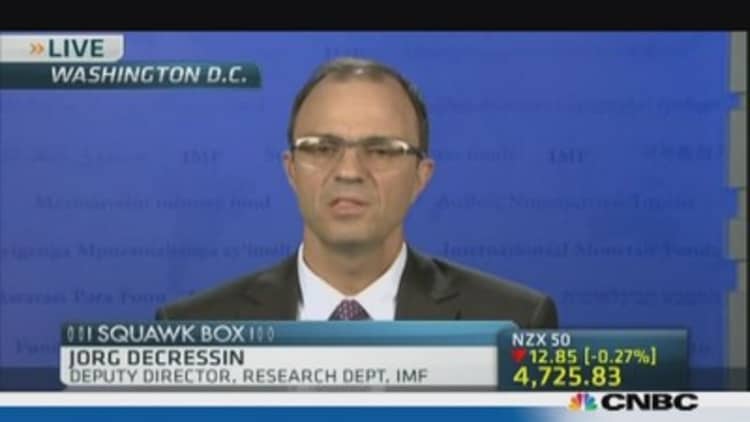
If the shutdown in Washington runs on for a month, the effects on the U.S. economy and global markets will be substantial, an IMF representative told CNBC on Wednesday.
"If it's a shutdown that lasts a month and is accompanied by financial turmoil, then the effects on the U.S. economy will be quite large and probably the rest of the world will feel them too," Jörg Decressin, deputy director of the research department at the International Monetary Fund (IMF) told CNBC Asia's Squawk Box.
Decressin's comments follow the release of the IMF's semi-annual World Economic Outlook report, and echo comments made by chief economist Olivier Blanchard at a Chicago news conference on Tuesday.
(Read more: US growth in danger as shutdown heads into second week)
The IMF revised down its 2013 and 2014 global growth forecasts to 2.9 percent and 3.6 percent, 0.3 and 0.2 percentage points lower than its previous forecasts respectively. The IMF cited concerns over slowing growth in the emerging world for the revision.
The report came as political stalemate in Washington looked set to move into its ninth day on Wednesday, and the October 17 deadline to raise the $16.7 trillion debt ceiling loomed.
Many fear that if the Republican and Democratic parties are unable to reach a compromise on budget issues and reopen the government, the U.S. could miss the debt-ceiling deadline and default on its debt.
In its report, the IMF flagged political uncertainty as a major headwind to global growth. The body's economists have since warned that if the U.S. does default on its debt obligations, it could tip the economy back into recession.
(Read more: Boehner: Can't raise debt ceiling without addressing borrowing)
"If there is a default then it will be very serious for the U.S. and the global economy," said Decressin.
"Almost surely the recovery in the U.S. will be derailed, there will be a recession and it could be even worse," he said.
Although the IMF report warned on slowing growth in emerging economies, namely China, India and Brazil, it expressed a relatively more optimistic view on advanced economies.
(Read More: IMF cuts growth forecast for emerging world)
"The good news is that the advanced economies are mending ," said Decressin.
"You are seeing strong private demand growth in the U.S., which this year has been counteracted by fiscal tightening from the sequester… But assuming that the political standoff in the U.S. finds an orderly resolution, you should be seeing higher growth next year because the fiscal drag will diminish," he added.
(Read more: Why Japan should fear US shutdown: IMF)
The IMF forecast the U.S. economy to grow 1.6 percent this year, and 2.6 percent next year, down 0.1 and 0.2 percentage points from its previous estimates.
Decressin added that improvements in the euro zone should help improve global growth in the coming years.
"You are also seeing the economies of the euro area coming out of recession and register positive growth next year. This is good for the world," he said.
The IMF lifted its 2013 forecast for the 17-nation euro zone to a 0.4 percent contraction from its previous forecast of a 0.5 percent contraction. It maintained its 2014 growth forecast of 1 percent.
(Read more: Euro zone 'not out of the woods yet': Pro)
The U.S. government has experienced 17 shutdowns in the past, only five of which have extended beyond eight days. The longest shutdown occurred on December 16, 1995, and lasted 21 days.
— By CNBC's Katie Holliday: Follow her on Twitter @hollidaykatie


